
- Details
- Written by: JD Stayfree
- Hits: 5075
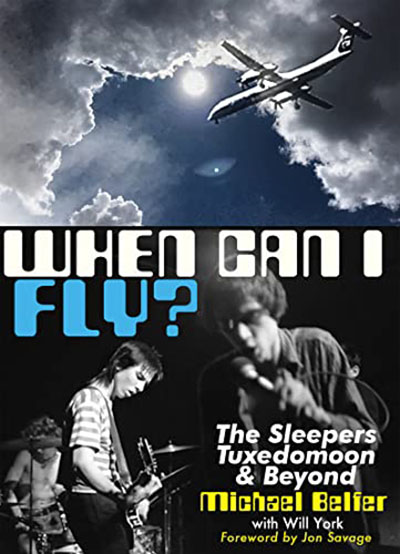 When Can I Fly? The Sleepers, Tuxedomoon & Beyond
When Can I Fly? The Sleepers, Tuxedomoon & Beyond
By Michael Belfer
Foreword by Jon Savage
Hozac Books
I'm not that into art rock or prog rock, or Devo or the Residents, or any shit like that, right? I'm a Dead Boys guy, not a Pere Ubu guy, you know what I mean? Man oh man, though, once you get about 20 pages into this book by San Francisco punk scene pioneer Michael Belfer (guitarist with The Sleepers and Tuxedomoon) it reads like a crazy fuckin' movie. What a wild freakin' life this dude had! WHOA!
If you read my columns and rants on a semi regular basis, you are probably already hip to my ongoing theory that there ain't many good bands no more in part because controlled media consolidation pummels us all day with time-waster buy shit/puppet celebrity fakes we never asked for, and partly, because there is such a shortage of affordable real estate spaces available to rehearse in, since the banking scum jacked up all the rents everywhere under Obama and Holder who actually even went to work for 'em after failing to prosecute anybody for the mass mortgage scams, and the landlords who used to rent working class homes to working class people flipped all their rentals into Airbnb’s and act like they're doing you some big fuckin' favor for painting their front porch steps purple, adding a hot tub and a Buddha statue to the yard and charging you $300 a night. These old punk bands paid like $300 a month, ya know?
- Details
- Written by: JD Stayfree
- Hits: 8795
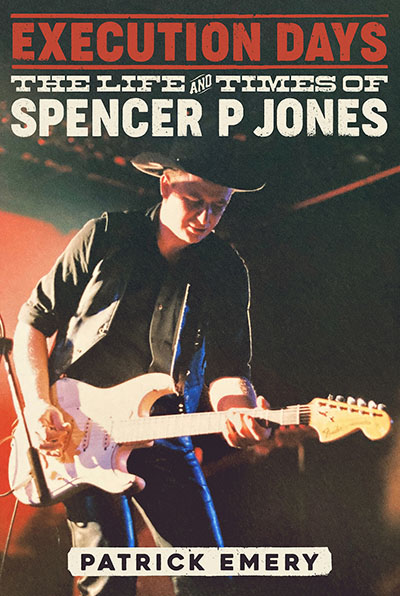 Execution Days: The Life and Times of Spencer P Jones
Execution Days: The Life and Times of Spencer P Jones
By Patrick Emery
Love Police
“Those who can make you believe absurdities, can make you commit atrocities.-Voltaire
"I was stripped of all my dignity, blackest clouds hanging over me, I just waited as the moments ticked away, it was like my execution day..." -Spencer P. Jones
"I thought, hold on, I've got a rock band around here some place!" - Tex Perkins
"Grief felt like fear" - C.S. Lewis
I WAS ALWAYS ON YOUR SIDE
Man I'm a little bit furious that those fucked-up Fascists at Facebook permanently locked me out and I knew it was coming, because I saw them doing all that same shit to all my friends who are antiwar, pro human rights and civil liberties, all us poor suckers who fell hard for all that phony shit they told us when we were growing up about the Bill Of Rights that they covertly dismantled but insist we still have, even though we very clearly do not, or anyone advocating for freedom for Julian Assange.
The bullshit fact checking, accusations of violating their so-called community standards, all that shit. I posted a lot of links to antiwar organizers and truth tellers who've been purged from Mocking Bird mass media. Zuckerberg and his Great Lockstep cronies decided it was better to purge some of us completely, rather than have us actively factchecking the factcheckers and pushing back against their dangerous bullshit police state narratives.
Thankfully, a very thoughtful and considerate friend thought to send me an electronic copy of a book I'd been yearning to read and I guzzled the whole thing down like a pint while I was unable to contact my comrades on social media.
- Details
- Written by: Robert Brokenmouth
- Hits: 4929
 Stranded. Australian Independent Music, 1976-1992. Revised and Expanded Edition
Stranded. Australian Independent Music, 1976-1992. Revised and Expanded Edition
By Clinton Walker (The Visible Spectrum)
First issued in 1996, the brilliant “Stranded” was Clinton Walker's second "overground" success (his first being his biography of Bon Scott two years earlier), and was a more readily-available primer on how Australian music - as a whole - abruptly changed into something both credible and world-class.
Yeah, and you disagree? Look, prior to 1978 (say) there were only a handful of bands determined, lucky, and good enough to get above the parapet and charge stark-naked and take on the world.
Around 1978, everything changed - though I'll emphasise that the world-wide impending undercurrent of change started way back. Hip young kids taking the present culture and either embracing it or pouring gasoline on it (or both), and investigating the past cultures and appropriating what they identified with.
In his preface to this edition (with "invisibly" revised original text and very visible expansions), Walker makes several statements I vehemently disagree with. This is unremarkable, as the nature of The Life is that it is mercurial, shape-shifting. For example, where Walker is amused by Sonic Youth's title “1991: The Year Punk Broke”, I thought it insanely naff, wrong and downright stupid.
- Details
- Written by: The Barman
- Hits: 5472
 Execution Days: The Life and Times of Spencer P. Jones
Execution Days: The Life and Times of Spencer P. Jones
By Patrick Emery (Love Police)
Perhaps the most surprising thing about Melbourne writer Patrick Emery’s exhaustively researched and engrossing biography of the late Spencer P. Jones is that it found a publisher.
Thanks to the internet, book publishing is a low-margin crap shoot. But Aussie publishing houses were already renowned for their lack of imagination and reluctance to take risks on books about anyone who’s not mainstream, middle-of-the-road or, ahem, National Living Treasures. Even those imprints that are outgrowths of universities, our bastions of free thought.
If you haven’t received a formal rejection letter from a friendly Aussie publisher after shopping a musician’s autobiography, you haven’t lived. The stupidity of not keeping and framing a letter that read, in part, “there is no market for this because Radio Birdman fans can’t read” is regrettable in hindsight – it should have gone straight to the pool room - but, fuck you, anyway, self-important publisher twat. You deserve to be shot by a ball of your own shit.
Patrick Emery suffered his share of similar fools while trying to place “Execution Days”.
- Details
- Written by: Robert Brokenmouth
- Hits: 4858
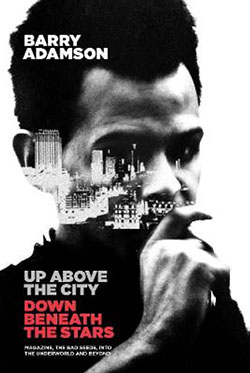 Up Above the City, Down Beneath the Stars
Up Above the City, Down Beneath the Stars
By Barry Adamson (Omnibus Press)
This autobiography is so sumptuous and clean that I don't want it to end, so I'm taking it in glorious nibbles. I haven't finished it yet, but sod that. You need to know how damned good it is, so I'm filing the review now. Just order it, buy it, demand it from your music emporium.
Barry Adamson is perhaps best known to the Australian rock 'n' roll world as a founder member of Magazine, covering for Tracy Pew while the latter was in jail, and the first four Nick Cave & the Bad Seeds LPs (and re-joining in 2013). He is also an accomplished producer of film scores.
His own band came to Australia in September 2012 on the back of his LP “I Will Set You Free”. I have very fond memories of that magnificent night in Adelaide, not least because I only recall three other friends there: one of whom we all miss terribly.
- Details
- Written by: The Barman
- Hits: 4776
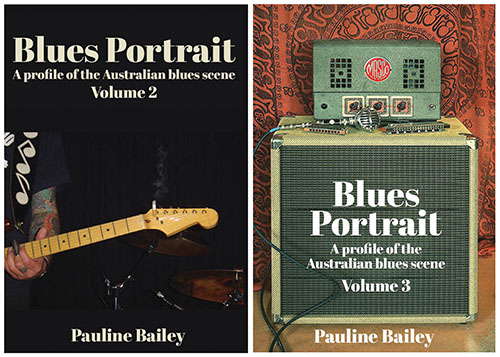 Blues Portrait Volume 2 by Pauline Bailey
Blues Portrait Volume 2 by Pauline Bailey
Blues Portrait Volume 3 by Pauline Bailey
If you want to pick an argument, get into a discussion with a professional musician about what constitutes blues music.
There are those who regard themselves as “blues players” and those who do not, and never the twain shall meet.
There’s a mindset among some self-described blues players that they’re the “real deal” and everyone else is not. It must really rankle for them to have seen the annual Bluesfest evolve into a (mostly bland) celebration of the mainstream.
- Details
- Written by: The Barman
- Hits: 6874
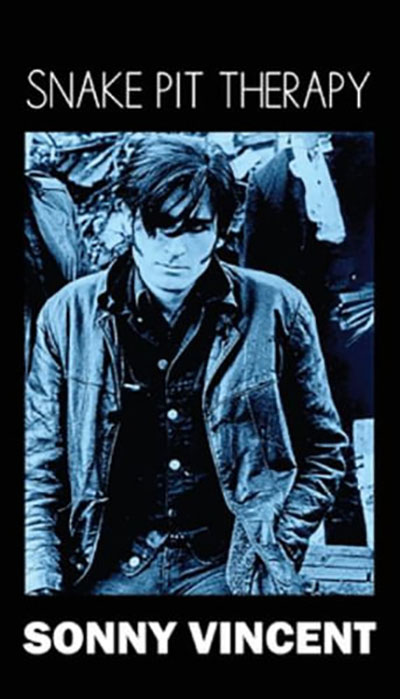 Snake Pit Therapy by Sonny Vincent (Far West Press)
Snake Pit Therapy by Sonny Vincent (Far West Press)
Don’t let its diminutive size lull you into thinking this book is in any way insubstantial. It’s pocket-sized so you can carry it on your person - like a concealed weapon.
Punk survivor Sonny Vincent’s first formal foray into being A Published Author packs a hefty punch in its 91 pages. Is it a memoir, a collection of prose or a bunch of musings from a hyperactive, creative mind? All of the above.
It’s not just punk rock and roll. “Snake Pit Therapy” bounces from childhood rejections of authority to tripped-out excursions around a dry-cleaning shop (‘You get $100 a day and all the cocaine you can snort,” read the note on the laundromat’s bulletin board’.)
There’s a bizarre vignette (“My Evil Little Krishna”) arguing with itself in the finest post-modern style, an ode to formica and an impenetrable prayer. There’s a story of a doomed smalltown newspaper run scam.
- Details
- Written by: The Barman
- Hits: 7102
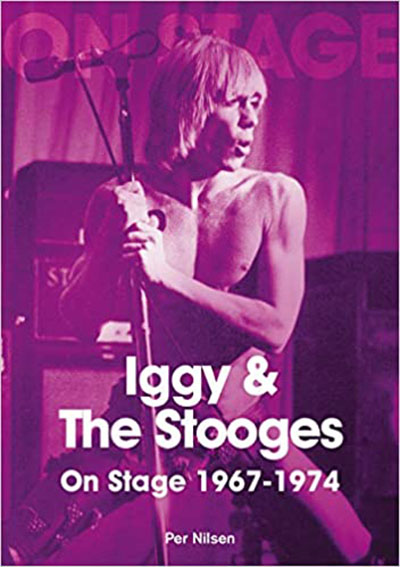 Iggy & The Stooges Onstage 1967-74 by Per Nilsen (Sonic Bond Publishing)
Iggy & The Stooges Onstage 1967-74 by Per Nilsen (Sonic Bond Publishing)
Cutting to the chase: This is an amazing book and an essential item for any Stoogephile. Swedish author Per Nilsen has pedigree – he wrote the world’s first Iggy Pop biography, “The Wild One”, way back in 1988 – and he’s an academic, so you know it’s going to be researched to, er, within an inch of its pretty face going to hell.
The concept is simple: Nilsen divides the original lifespan of the Stooges into logical chunks, provides contextual information and then lists every show played, accompanied by as much information as is available. Yes, every show. He draws on a mix of primary sources and published interviews. He relies heavily on advertisements and reviews from local papers, underground press like The Fifth Estate and Natalie Schlossman’s fan magazine “Popped”.
You can’t beat great research. Nilsen picks up inaccuracies published elsewhere and rules out advertised gigs that were never played. He even calls out a minor error in Paul Trynka’s definitive “Open Up and Bleed” book. I’m not sure the road crew accounts here of the alleged Goose Lake shutdown tally with the Third Man Records record of the same show, but they make fascinating reading.
The roll-call of first-hand accounts is impressive. Early manager Jimmy Silver is a big catch. James Williamson’s bad guy rap for poisoning the band is shown to be the ill-considered myth that it is, with tour manager John Adam (aka The Fellow) confirmed as the real catalyst for various members’ heroin habits.
The Decline Years of the Stooges, post-Mainman, hold a certain fascination for hardcore fans. Part of it is voyeurism – a peek into the on-the-road medicine cabinet and the approval-seeking, self-insulating excesses that it fuelled in a damaged singer – and the other part is wondering why the band kept going on its march of death.
- Details
- Written by: By Murkkka's Favorite Dishwasher, General Labor
- Hits: 4933
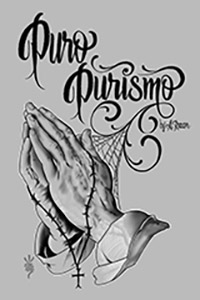 Puro Pursimo by A. Razor (Punk Hostage Press)
Puro Pursimo by A. Razor (Punk Hostage Press)
"The words are where we worship...." (-A.Razor)
Post-Grunge, there were still at least a few little magazines, independent record labels, real record stores and big city nightclubs where cool little bands could do their thing. Now, that stuff's even mostly gone. Immediately, Post-Grunge, though, there was like, 10,000 shite bands, too. Every town had a fake Blues Explosion, a fake Sonic Youth, a fake Nirvana, a fake Chili Peppers, etc., etc. If I wasn't moved by the originals, I surely had no time for their local small pond, bad impressionist, franchise clone, cut rate imitators.
Macho bellowing metal merchants, goofy whiteboy funk and swing bands, Clash-Ramones-Thunders rip-off bands, tribute acts, but few of 'em really had their own style, statement, message, or tunes. Some of the most fondly remembered bands of that era had no memorable music, at all, you can't even sing me one of their songs if I asked you to on the curb in an unguarded moment - it was just the threads everybody seemed to like. Money and clothes, that's all they had goin'. Suits and deep cocaine pockets.
More Articles …
Page 4 of 10
